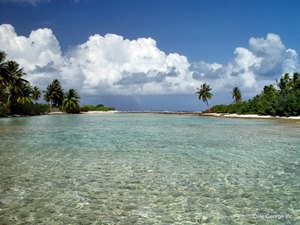 People of Manihi are open, really kind and a little bit modest. Despite the many centuries of being ruled by Europeans, people have never forgotten their traditions and been honouring ancestors' spirits. All in all, locals have a controversial about Frenchmen. Some inhabitants want more freedom and autonomy and live in their own way, the others are proud of being a French citizen and happy to have those possibilities that it provides. Nevertheless, people treat tourists from all over the globe quite friendly but also kind of cautiously. Locals usually never start communication themselves, and still, they’re actually glad that someone is sincerely interested in their customs and traditions. People here on the island believe that not just people but also spirits which accompany humans during their whole lives meet each other as well.
People of Manihi are open, really kind and a little bit modest. Despite the many centuries of being ruled by Europeans, people have never forgotten their traditions and been honouring ancestors' spirits. All in all, locals have a controversial about Frenchmen. Some inhabitants want more freedom and autonomy and live in their own way, the others are proud of being a French citizen and happy to have those possibilities that it provides. Nevertheless, people treat tourists from all over the globe quite friendly but also kind of cautiously. Locals usually never start communication themselves, and still, they’re actually glad that someone is sincerely interested in their customs and traditions. People here on the island believe that not just people but also spirits which accompany humans during their whole lives meet each other as well.
Locals had been improving their recipes from island plants, seafood and games for many centuries. Interaction with Europe and Asia influenced the local cuisine and diversified it with …  Open
Open
It's hard to call Manihi a densely populated territory. The last census showed that just about 800 people inhabit the island, and the main activity here is still fishing just like it was …  Open
Open
 The great majority of locals are in family relations. Family is extremely significant for local inhabitants, not just parents and kids but also cousins and other distant relatives are considered to be close ones. Fetia is a Polynesian term that defines a big family. Everybody in fetia is connected with each other with mutual obligations. For example, there is a tradition to bring kids with no parents to childless women.
The great majority of locals are in family relations. Family is extremely significant for local inhabitants, not just parents and kids but also cousins and other distant relatives are considered to be close ones. Fetia is a Polynesian term that defines a big family. Everybody in fetia is connected with each other with mutual obligations. For example, there is a tradition to bring kids with no parents to childless women.
Manihi is a perfect place for tourists who prefer calm holidays alone with pure nature. In general, the atoll can’t be called an overpopulated one – just about 800 people inhabit it, …  Open
Open
 Local don’t really enjoy responsibilities. They would rather choose to enjoy every day and not to worry about all those deadlines. Made it today – good, not – also good. People here hugely celebrate Chinese New Year, European Victory Day, French National Day, and their own Independence Day. You’ll be able to see diverse colourful rituals as well as dancing performances of native Polynesians not just once or even twice. If you want to find out more about local culture, then the Heiva Festival is perfect for it. It takes place in the first week of July.
Local don’t really enjoy responsibilities. They would rather choose to enjoy every day and not to worry about all those deadlines. Made it today – good, not – also good. People here hugely celebrate Chinese New Year, European Victory Day, French National Day, and their own Independence Day. You’ll be able to see diverse colourful rituals as well as dancing performances of native Polynesians not just once or even twice. If you want to find out more about local culture, then the Heiva Festival is perfect for it. It takes place in the first week of July. National traditions of French Polynesia
 Although tensions may arise between ethnic groups in French Polynesia due to cultural differences and belonging to different stratum of society, it is not typical for locals to discriminate because of nationality or religion. Hate crimes on the islands are also very rare. The poor, as well as the rich from the upper class among the Polynesians, are relatively few; majority of the islanders belong to the middle class and the lower middle class. Wealthy people can always be identified by huge houses, expensive branded clothing and the possession of imported items, such as cars.
… Open
Although tensions may arise between ethnic groups in French Polynesia due to cultural differences and belonging to different stratum of society, it is not typical for locals to discriminate because of nationality or religion. Hate crimes on the islands are also very rare. The poor, as well as the rich from the upper class among the Polynesians, are relatively few; majority of the islanders belong to the middle class and the lower middle class. Wealthy people can always be identified by huge houses, expensive branded clothing and the possession of imported items, such as cars.
… Open 

